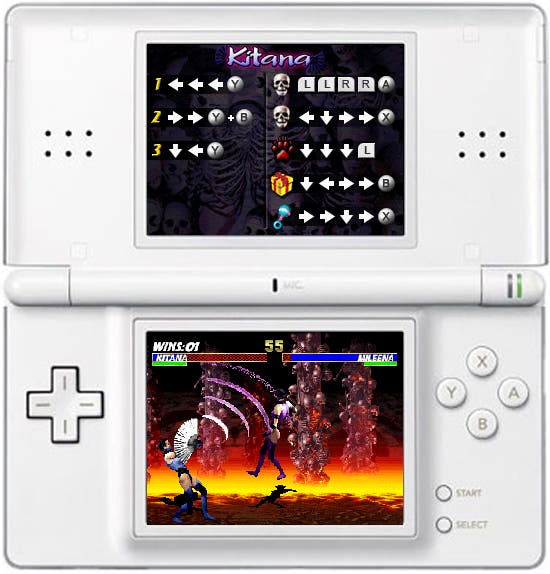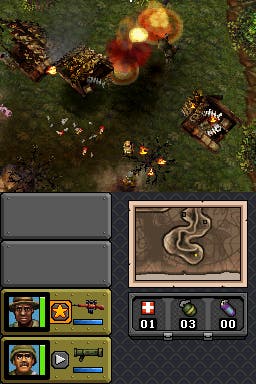DS Roundup
Warhammer Squad Command, Myst, Jenga, Mortal Kombat and Op: Vietnam.
Jenga World Tour
- Developer: Atomic Planet
- Publisher: Atari
"You don't have to pick up the pieces!"
If I were selling this game and trying to come up with short, snappy reasons to buy it, that would be the bullet point I'd put in bold on the back of the box. And it's true. Jenga is the modern parlour game that involves taking it in turns to pull bricks from a teetering tower until the unlucky player topples it. What a mess. Its beginning is tedious set-up; its conclusion is clattering, humiliating destruction and tedious putting away. But that's the point: the element of risk in toppling the blocks too soon is there because of the time it takes to prepare, and the videogame version does not replicate that.
Furthermore, Jenga's very nature is to be a tactile game of steady nerves and steadier hands. Pulling bricks out by dragging the stylus cannot match that sensation, nor does it provide an alternative, entertaining approach. It's far too simple and what little challenge there is becomes negated by the game's insistence in indicating by colour which block will be easiest to pull out.
The various extras like immovable blocks and distracting objects add nothing to the experience; the single-player 'story' mode can be finished in an hour; and the multiplayer rather stingily asks for more than one card to play together. Low scores are usually given to bug-ridden games with little imagination, designed with incompetence. This game gets a low score because there is no point to it.
Mind you, you don't have to pick up the pieces.
2/10
Ultimate Mortal Kombat
- Developer: Other Ocean Interactive
- Publisher: Midway
Despite knowing that Mortal Kombat was influenced by Jean-Claude Van Damme, we prefer to think of it as being a little closer to Steven Seagal: inexplicably popular among a moronic subset of the public; continues to receive work despite being a product of a more gratuitous past; and recently became rather bloated - the last console sequel, Armageddon, had a bigger cast than an elephant with a broken leg.
For a game that feels like it's been trapped in the nineties, perhaps it's wise for this DS version to be a port of the revised 2D arcade version of Mortal Kombat 3 from 1995 instead of something new (incidentally, UMK3 also appeared on 360's Live Arcade last year). It's a surprisingly good fit. The blocky, digitised characters that made MK's name work well on the small screen, and the angular d-pad captures the nostalgic essence of bashing away on an inappropriate 16-bit joypad.

The game wisely eschews touchscreen controls, and the second screen is used only to display each fighter's special moves and fatalities. It's something of a thoughtful addition when the alternative is either pausing to go into the options menu, or scrabbling around for the manual.
Single-player is a relentlessly brutal affair. AI is rather harsh, even on the easiest level, and even projectile spamming or button pummelling doesn't always result in a victory when your competitor gets into a rhythm and starts blocking your show-off moves. There's at least some challenge to getting better. Those annoyances don't necessarily crop up in multiplayer, though, and general combat is able to improve with a tiny bit of practice (there are no modes other than a few tournaments of various difficulties). Like any fighter, there's scope to learn more in the way of combos and such, but then again, the Mortal Kombat series never really was about providing the complexity to reward high level play, and character design generally isn't solid enough to inspire devoted mastery anyway.
There's still pleasure to be drawn from a game that was arguably at the peak of its powers on its original release. Inasmuch as while it had the heart of a serious beat-'em-up, it also had a sense of its own ridiculousness, and its ludicrous OTT violence and its silly babalities and animalities lend a sense of lightweight fun to proceedings. Such an incongruous mixture has a stupid charm, even if the overall package proves less nutritional than some other fighters. There may never be a beat-'em-up of its type again, so it's nice to be entertained by its bull-headed presence on a handheld format once more, at least as long as the online multiplayer sustains an audience.
Also included on the card as a double feature, is Puzzle Kombat, last seen in last-gen's MK: Deception. It's entirely reminiscent of Super Puzzle Fighter Turbo, being a block drop-and-match challenge against super-cute versions of MK characters. Like the main game, it can be played online. If only its sedate beginning and dreary atmosphere didn't make it a throwaway extra, we'd probably recommend it. But we won't.
6/10
Operation: Vietnam
- Developer: Coyote Console
- Publisher: Majesco
While it might be a no-brainer to some, the world's still waiting for a decent handheld version of Cannon Fodder. There was valiant effort made by the Gameboy Color many years ago, a mobile phone game, and a recently planned PSP version which was quietly cancelled. But still we wait for a definitive DS update.
Volunteering to fill that desirable gap is Operation: Vietnam, a blatant homage to Sensible's classic. A squad of cartoon-looking soldier sprites battle through a top-down jungle. Like CF, it wants to play arcade-serious while still having time to wedge its tongue in its cheek with various homages. In O:V's case a sly nod towards 'Nam movie clichés and classic quotes. All comparisons to Cannon Fodder stop here, however, as this is an inevitably inferior clone.

Each of your soldiers possesses a different weapon - the soldier with the rapid fire gun; the sniper with the long-distance rifle for picking things off; the bazooka-wielder for slow but heavy damage; and the medic, whose pea shooter is a little bit useless, but who gets a boost for using medipacks. Characters can be switched to and fro at will, letting you choose the right character for the right situation, or sometimes splitting your team up on different missions to force you to use only what you've got. No character-specific puzzles, though; just shooting.
Stop and go commands can be issued to team members by touching the bottom screen, which also contains a rudimentary map to tap on to view. Unfortunately that's as far as stylus use stretches. Shooting at enemies uses a rather irritating automatic lock-on feature instead of letting you use touch screen targeting, or even fire where you want with the face buttons. The lock-on's handy when staying still, but quickly moving away can break contact, leaving you confusedly firing towards nothing. When big, orange bullets are zipping every which way, it's important to be in control and O:V incompetently wrenches that control away most times.
Maps are too long and slow-paced when they should be frenetic and bite-sized. You're also cruelly put right back to the start should you lose all your men - a considerable threat when the difficulty eventually ramps up later on in its ten or so missions. While the low-budget concessions may allow us to forgive it some faults when it behaves itself, we won't be having flashbacks over this one.
4/10